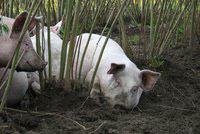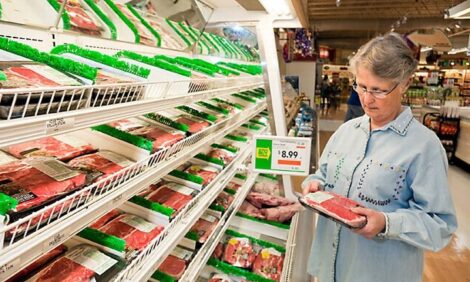



Improving Health, Welfare of Organic Pigs
DENMARK - Organic sows and their piglets can be put out to roam on areas planted with trees. This can improve the health and well-being of the animals and is in fact also better for the environment than keeping pigs on pasture.
The concept of free-range pig production will soon take a different turn with the start of a new project led by scientists from Aarhus University. The project aims to improve the environmental impact and pig health and welfare of organic pig production by allowing the sows with their piglets to spend more time together and to spend this in wooded areas rather than on open pastures. The biomass from the trees can be used for energy production.
Organic pig farmers receive twice as much for their product as conventional farmers and exports of organic pork have contributed significantly to Danish exports of organic products reaching one billion kroner in 2012. But organic pig production is not without its challenges – in terms of impact on environment, climate and animal welfare.
"In the organic systems used today, the climate impact is not significantly different from conventional production. At the same time, the existing pig houses with solid outdoor areas are often inappropriate in terms of hygiene management and are characterised by large ammonia losses," said section manager and leader of the project, John E. Hermansen.
Post-weaning scours can also be a big problem in free-range production when the piglets are weaned from their mothers and moved indoors. The scientists therefore propose a new kind of organic pig farming production system where there would be even higher consideration for the environment and animal health and welfare. The new project will test the system in practice and examine the effects on animal health, welfare and productivity and on nutrient emissions and carbon storage.
Organic woodland pork
The concept is based on integrating the production of free-range pigs with woody biomass for bioenergy.
The enclosure for the outdoor pigs is more than just a simple pasture; the field will also be planted with trees for biomass production. The trees can reduce the leaching and evaporation of some of the nutrients that the pigs leave behind in the form of manure and urine. By converting the trees into energy, greenhouse gas emissions from the production can be reduced. The trees will also provide shade and activity for both sows and piglets.
The pigs are weaned at a later age than usual and are finished in a new housing concept with no paved outdoor area. The piglets are thus outdoors with the sow for a longer period. The outdoor life can promote healthier and more robust pigs. Less disease and happier pigs will improve animal welfare and reduce the need for antibiotics.
"The new form of production can help to make this type of competitive, responsible and resource-efficient organic pig production more popular," said Mr Hermansen.
The 3.5-year project has been granted 8.9 million Danish kroner from the Green Development and Demonstration Programme of the Ministry of Food, Agriculture and Fisheries. Participants in the project include Aarhus University (project manager), Center of Development for Outdoor Livestock Production, Knowledge Centre for Agriculture, Pig Research Centre, Organic Denmark and two organic pig farmers.
The project, called pECOSYSTEM, is an Organic RDD2 project, which is funded by the Ministry of Food, Agriculture and Fisheries and coordinated by the International Centre for Research in Organic Food Systems (ICROFS).








